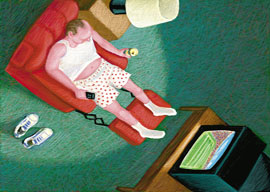
November 03, 2013

Source: Shutterstock
It may seem paradoxical to claim that entertainment is a serious cause of boredom. But as TV Lobotomie demonstrates, children who grow up with TV as a large part of their mental diet have difficulty concentrating for the rest of their lives, and since the ability to concentrate is essential to finding anything interesting that is not swift-moving and sensational, and since also a large part of life is necessarily not swift-moving and sensational, those brought up on TV are destined for boredom. Degradation relieves their boredom. Better a life of sordid crises than a life like a flat-line encephalograph.
Most parents believe that television is bad for their children, but they insist that they watch it nonetheless. Indeed, they train them to do so, for contrary to what many might think, television is not immediately attractive to young children, who would rather do something else than watch it. Having become accustomed to it, however, they need it as an addict needs his drug. The more they watch it, the worse their likely path through life. Before anyone objects that this is because those children who watch the most television come from bad homes, let me point out first that the relationship between television and scholastic failure (for example) is a causative one, and second that the worst effects of television are seen in the best homes not the worst, precisely because children from the best homes”by best, I mean those with educated parents and high incomes, admittedly a rather reductive definition”have the best cognitive prospects to ruin. As modern European architects have discovered, it is far easier to ruin the good than improve the bad.
To my shame, and against my principles, I have occasionally agreed to appear on television, though even less frequently than I have been asked. I have found those who work for TV broadcasting companies to be the most disagreeable people that I have ever encountered. I far preferred the criminals whom I encountered in my work as a prison doctor, who were more honest and upright than TV people.
In my experience, TV people are as lying, insincere, obsequious, unscrupulous, fickle, exploitative, shallow, cynical, untrustworthy, treacherous, dishonest, mercenary, low, and untruthful a group of people as is to be found on the face of this Earth. They make the average Western politician seem like a moral giant. By comparison with them, Mr. Madoff was a model of probity and Iago was Othello’s best friend. I am prepared to admit that there may be”even are”exceptions, as there are exceptions good or bad in every human group, but there is something about the evil little screen that would sully a saint and sanctify a monster.
Turn off, tune out, drop completely.